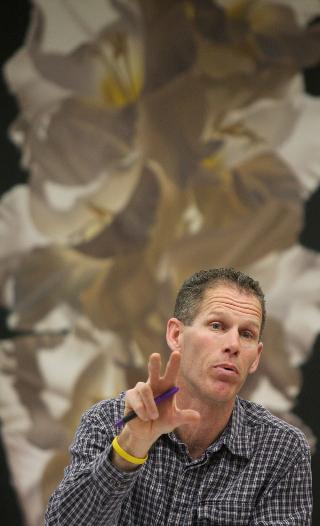Graduation requirement proposal fails in senate
The faculty senate voted Tuesday against supporting the addition of a writing-intensive requirement for graduation proposed by Tim Taylor, director of Writing Across the Curriculum.
Taylor appealed to faculty senate members on Feb. 9 to support a proposal that would establish a minimum level of writing-centered and/or writing-intensive courses all Eastern students would have to take.
The proposal also said that all new students, including transfer students, would need to take four writing-centered and/or writing-intensive courses beyond the first-year writing sequence ENG 1001 and 1002.
Within these classes, Taylor proposed that 35 percent of the final course grade would be based in writing.
Dawn VanGunten, vice chair of the faculty senate, said she wanted to see clearer guidelines pertaining to how the graduation requirement would be enacted on campus and who would be in charge of determining whether a course met the criteria before approving the proposal.
Faculty senate member Joy Russell echoed VanGunten’s concern for a lack of information.
“At the last meeting, I heard Tim Taylor say that, conceivably, ‘departments would have to go back and revise their syllabi,'” Russell said. “That’s not a reality for fall 2010. I just don’t think this answers things all the way through. How will we transition, and what’s it going to look like?”
She also expressed concern for the implications in approving a graduation requirement that could potentially prolong programs.
“I’m very concerned that in this day and age, we’re trying to get students to come to Eastern,” Russell said. “What will be the impact on transfers when things aren’t very clear-cut?”
Other senate members wondered how the new graduation requirement would affect students in specific majors that do not tend to incorporate as many writing assignments as others.
Faculty senate member Andrew Methven said the requirement could negatively affect students involved in the pre-nursing program at Eastern for the typical two years before transferring to Lake Land College.
“I know some have gotten snagged in the existing policy, not having enough assignments and having to wait to take another writing class before moving on,” Methven said.
Faculty senate member Andrew White agreed with Methven and reiterated that the proposal would be met with resistance from departments across campus.
“I talked to half a dozen faculty members in the math department, and I didn’t find very many of them to be enthusiastic,” White said. “One flat-out said, ‘No, I’m not going to have 35 percent of my class be writing.'”
The faculty senate ultimately voted against supporting the proposal, which will serve as an advisory decision before the Council on Academic Affairs executes a final vote, said faculty senate recorder Jonathan Coit.
Though the proposal failed, some members of the senate said they would not be opposed to reconsidering if they were presented with answers to their questions.
“I agree with the need to write,” said faculty senate member John Best. “But in a complex environment of higher education, it’s very difficult to implement these kinds of changes.”
Senate members also participated in a timeline activity led by William Weber, vice president for business affairs.
Weber explained that the activity’s purpose was to end up with a prioritized list of themes the faculty senate believes must seriously be considered during the process of planning for the Campus Master Plan this year and the Strategic Master Plan next year.
“Planning is not something that I believe we’ve done terribly well in past years,” Weber said.
He then instructed members to write events, trends or issues they expect Eastern to face from 2010 to 2020 on post-it notes and stick their concerns to sheets of paper displaying the corresponding year that lined the wall.
Members offered suggestions of wireless Internet access in residence halls in 2010 and online master’s programs in 2012.
Other concerns included new government and administration in 2011, along with offering more foreign languages that year, as well as a liberal arts/humanities center.
Best said he sees it necessary to rethink the role of the university as the pace of change continues to accelerate.
“As educators, we’re not doing a good job of looking down the road,” he said. “How are we going to make a transition nimble enough to catch up?”
Erica Whelan can be reached at 581-7942 or elwhelan@eiu.edu.
Graduation requirement proposal fails in senate

Faculty senate chair John Pommier speaks to the faculty senate Tuesday in Booth Library. The piece of art displayed behind Pommier is Winifred Godfrey’s “White Gladiolus.”(Amir Prellberg/The Daily Eastern News)





































































